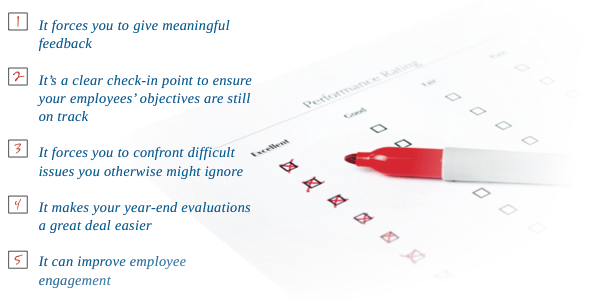Unlike the annual end-of- year company get-together, the process of an employee evaluation is not one many managers or employees look forward to. According to the ar ticle “Why Employees Don’t Like Performance Appraisals” on Chron.com, performance appraisals cause employees to fret over job security, status, eligibility for promotion and possible bias or unfair ratings.
Employee evaluations don’t have to be a necessary evil in the business world. The evaluation procedure does not have to be one of stagnation or discomfort if some basic principles are understood.
Why Conduct Employee Evaluations?
The most frequent reason employers don’t conduct employee evaluations is attributed to the fact that they find reviews to be a time employees complain instead of embracing constructive criticism. There’s some truth to the fact that it is an opportunity for employees to provide insights to their job satisfaction or dissatisfaction, but if you aren’t willing to consider both sides, how are you improving your operations? Employee evaluations – often performed mid-year and annually – offer many benefits for management. The Forbes.com ar ticle “5 Good Reasons to Do a Formal Mid- Year Employee Evaluation” shares why thorough reviews can be beneficial:
Planned evaluations throughout the year allow for open, honest communication. It’s an opportunity to congratulate employees on a job well done and point out positives as well as discuss where improvements are necessary. Reviews grant team members the opportunity to receive a clearer understanding of job requirements and expectations, and allow both management and employee to have a voice.
Sounds Good, but How Do I Ensure Effectiveness?
Effectiveness all boils down to deliver y. There are numerous online formats and seminars for “effective” employee evaluations that management can follow. And although forms are a great guideline as they provide a plan of action, Inc. magazine’s online article “How to Conduct Annual Employee Reviews” reports that preparing for an employee evaluation should happen before the position is even filled. This is achieved by setting specific benchmarks early and outlining exactly what the job will entail. Having clear objectives already set in place throughout the job description will offer your candidates a clear understanding of the kinds of duties they will be expected to carry out and how they will be expected to do them.
These successful employee evaluation methods include management offering their employees up to one hour of uninterrupted attention in a setting that reflects the formal or informal culture of your company, and objective reviews that steer clear of degrading statements toward the employee which can lead to possible legal action. For example, instead of telling an employee, “You’re lazy,” phrase the same notion in a way that is professionally sound and humanly acceptable, such as, “I would like to see more enthusiasm in this area.” Additionally, always lead off with positive obser vations you’ve made regarding your team members’ work habits, as beginning the process with the downside of things could cause immediate employee shutdown.
What Kind of Changes Should I Expect After an Evaluation?
Setting expectations in business is necessary for the sake of professional longevity. After navigating a fruitful employee evaluation, one major take- away should be that both parties have a clear understanding and mutual agreement of what is expected of the employee and how management can help them achieve those goals.
As a final point, according to Lynne Lee, human resources manager, PreGel AMERICA, the moral of conducting employee evaluations is simple, “If you never tell someone they are performing aspects of their job incorrectly, or not up to the level which they signed on to perform, then you are doing a disservice to yourself and your employee.”
A collective understanding of what’s best for the future of business and personal career development overall is what makes evaluations something necessary but not evil.

